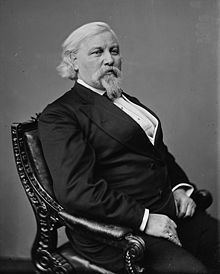Marshall Jewell
| Marshall Jewell | |
|---|---|
 |
|
| 44th Governor of Connecticut | |
|
In office May 5, 1869 – May 4, 1870 |
|
| President | Ulysses S. Grant |
| Lieutenant | Francis Wayland |
| Preceded by | James E. English |
| Succeeded by | James E. English |
| 46th Governor of Connecticut | |
|
In office May 16, 1871 – May 7, 1873 |
|
| Lieutenant | Morris Tyler |
| Preceded by | James E. English |
| Succeeded by | Charles R. Ingersoll |
| 25th United States Postmaster General | |
|
In office August 24, 1874 – July 12, 1876 |
|
| Preceded by | James William Marshall |
| Succeeded by | James Noble Tyner |
| 8th Chairman of the Republican National Committee | |
|
In office 1879–1880 |
|
| Preceded by | J. Donald Cameron |
| Succeeded by | Dwight M. Sabin |
| Personal details | |
| Born |
October 20, 1825 Winchester, New Hampshire, U.S. |
| Died | February 10, 1883 (aged 57) New Haven, Connecticut, U.S. |
| Political party | Republican |
| Profession | Politician |
| Signature | |
Marshall Jewell (October 20, 1825 – February 10, 1883) was a manufacturer, pioneer telegrapher, telephone entrepreneur, world traveler, and political figure who served as 44th and 46th Governor of Connecticut, the U.S. Minister to Russia, the 25th United States Postmaster General, and Republican Party National Chairman. Jewell, distinguished for his fine "china" skin, grey eyes, and white eyebrows, was popularly known as the "Porcelain Man". As Postmaster General, Jewell made reforms and was intent on cleaning up the Postal Service from internal corruption and profiteering. Postmaster Jewell aided Secretary of the Treasury Benjamin H. Bristow shut down and prosecute the Whiskey Ring. President Grant, however, became suspicious of Jewell's loyalty after Jewell fired a Boston postmaster over non payment of a surety bond and asked for his resignation.
A native of New Hampshire, Jewell was the son of a prominent tanner and currier; having apprenticed in his father's tannery business. Jewell moved to Boston where he learned the art of being a currier. In 1847, Jewell moved to Hartford where he worked for his father's business as a currier. Jewell stopped working as a currier and became a skilled telegrapher, where he worked in New York, Ohio, and Tennessee. Jewell was a Whig who supported the election of Zachary Taylor to the office of the Presidency. Having supported Taylor, Jewell moved to Mississippi where he was elected General Superintendent of Telegraphers. Jewell moved back to New York in 1849, and in 1850 he returned to his father's tannery business having entered into partnership with his father. Between 1859 and 1860, Jewell traveled to and visited Europe on business connected with the tannery firm, having returned to the United States during the onset of the American Civil War. In 1865 Jewell returned to Europe and traveled to Egypt and the Holy Land.
...
Wikipedia
